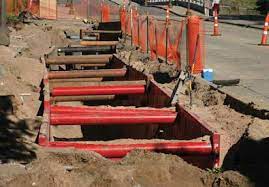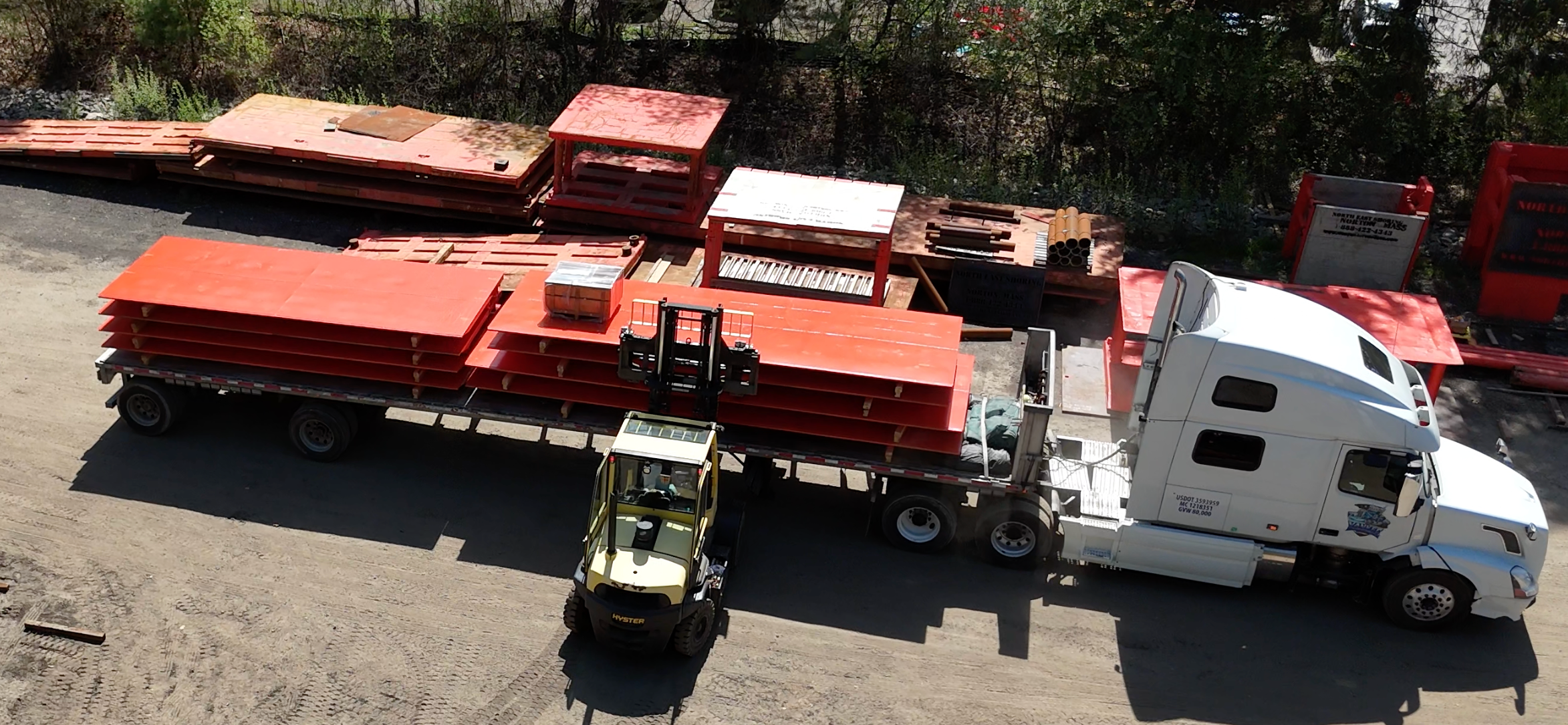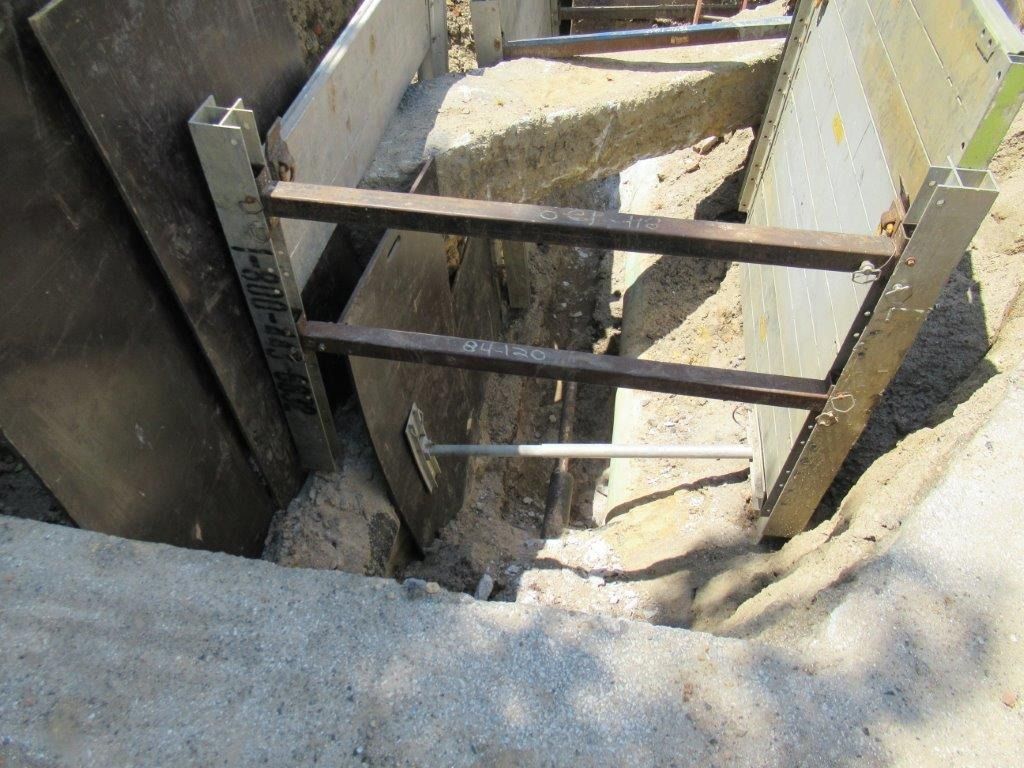Introduction
Excavation work is dangerous, and trench collapses are a leading cause of injuries and fatalities in construction. Trench boxes play a critical role in keeping workers safe by preventing cave-ins and creating a secure work environment. Every contractor must choose the right trench box based on factors such as project type, soil conditions, trench depth, and budget.
The Occupational Safety and Health Administration (OSHA) requires protective systems for trenches deeper than five feet, making trench boxes essential for compliance. Selecting the wrong type of trench box can lead to delays, added costs, and safety risks. This guide will help contractors understand the different types of trench boxes and how to choose the best one for their specific needs.
Understanding Trench Boxes
What is a Trench Box?
A trench box is a protective structure designed to prevent soil from collapsing into an excavation site. It consists of two heavy-duty sidewalls supported by spreaders that keep them in place. Workers can safely operate inside the trench while being protected from soil movement.
Trench boxes are commonly used in construction, pipeline installation, and utility work. They provide structural support for excavation sites, ensuring workers can complete tasks like laying pipes, repairing underground utilities, or installing drainage systems without the risk of cave-ins.
How Are Trench Boxes Different from Other Protective Systems?
Trench boxes are just one type of protective system used in excavation work. Here is how they compare to other methods:
- Trench Shields: Similar to trench boxes, but designed for lateral protection only. They do not prevent trench wall movement.
- Hydraulic Shoring: Uses hydraulic pistons to apply pressure to trench walls. It is adjustable and provides more flexibility than trench boxes but requires frequent monitoring.
- Sloping and Benching: A method where the trench walls are cut at an angle to prevent collapses. This technique requires extra space and may not be practical for all projects.
Industries That Use Trench Boxes
Trench boxes are widely used in infrastructure projects and underground work. Some of the key industries that rely on trench boxes include:
- Construction: Used for foundation work, underground parking, and road development.
- Utility Work: Essential for laying and repairing water, gas, and sewer lines.
- Pipeline Installation: Helps stabilize trenches for large-scale pipeline projects.
- Municipal Work: Used in public works projects such as drainage system repairs and fiber optic cable installation.
Real-World Example: A city contractor working on a water main replacement project used trench boxes to protect workers in a 10-foot-deep trench. Without the trench box, the risk of soil collapse would have been high, especially in areas with loose or sandy soil.
Understanding trench boxes and their role in excavation safety helps contractors choose the right system for their job, ensuring efficiency, compliance, and worker protection.
Key Factors to Consider When Choosing a Trench Box
Trench Depth and Soil Type
The depth of a trench is one of the most important factors in selecting the right trench box. Deeper excavations require stronger and more durable trench boxes to withstand soil pressure. For trenches exceeding 20 feet, OSHA requires an engineer-approved protective system, making it crucial to choose a box that meets these safety requirements.
Soil type also plays a major role in trench box selection. Soft or loose soil, such as sandy or clay-heavy ground, can shift easily, requiring trench boxes with reinforced walls and strong lateral support. Rocky or compacted soil may not shift as easily but can create uneven surfaces that require a more rigid structure. OSHA classifies soil into three types: Type A, Type B, and Type C, with Type C being the most unstable and requiring the strongest protective measures.
A contractor working on a pipeline installation in a sandy coastal area used a steel trench box with reinforced spreaders to prevent the trench from collapsing. Without this additional support, the loose soil could have shifted, creating a hazardous environment for workers.
Material Type: Steel vs. Aluminum Trench Boxes
Choosing between steel and aluminum trench boxes depends on project requirements, site conditions, and mobility needs.
Steel trench boxes are best suited for deep excavations and heavy-duty projects. They provide strong protection against soil pressure and are ideal for large-scale construction sites. However, steel boxes are heavy and require machinery for transport and installation.
Aluminum trench boxes are lightweight and easy to transport. They are ideal for smaller jobs, utility work, and projects where frequent repositioning is necessary. While aluminum is not as strong as steel, it provides sufficient protection for shallow to medium-depth trenches.
Steel vs. Aluminum Trench Boxes Comparison
| Feature | Steel Trench Boxes | Aluminum Trench Boxes |
|---|---|---|
| Weight | Heavy, requires machinery | Lightweight, easy to move |
| Durability | Extremely strong, suitable for deep trenches | Less durable, ideal for shallow trenches |
| Cost | Higher initial investment | More affordable upfront |
| Best Use | Large-scale construction, deep excavations | Utility work, smaller projects |
Pro tip: If a project requires frequent movement and easy setup, aluminum trench boxes are a better choice. For deep excavations or high-pressure soil conditions, steel trench boxes provide the best durability and safety.
Size and Adjustability
Trench box dimensions should match the job site requirements. Length, width, and height all play a role in selecting the right box. A trench box that is too small may not provide adequate protection, while a box that is too large may be difficult to position correctly.
Modular trench boxes offer flexibility for different trench widths and can be adjusted based on the needs of the job. They are ideal for sites where trench sizes may change or where access is limited. Fixed trench boxes, on the other hand, provide a set size and are often more rigid and durable.
A city contractor working on a utility repair project in a narrow downtown street needed a trench box that could be adjusted to fit the tight space. A modular aluminum trench box allowed workers to create a safe work zone while maintaining access to surrounding infrastructure.
Compliance with OSHA Regulations
OSHA trench safety standards require protective systems for trenches deeper than five feet. Choosing a trench box that meets or exceeds OSHA guidelines is essential to ensuring worker safety and avoiding compliance violations.
Trench boxes must be rated for the expected soil conditions and depth of excavation. OSHA mandates that trench protective systems be designed or approved by a qualified engineer when trenches exceed 20 feet in depth. Certifications and regular inspections help ensure that trench boxes remain in good working condition and meet industry standards.
Failing to comply with OSHA regulations can result in significant fines and put workers at risk. Contractors should always verify that their trench boxes meet certification standards and are properly maintained before use on a job site.
Rental vs. Purchase: What’s the Best Option?
When to Rent a Trench Box
Renting a trench box is the best choice for short-term projects, especially when budget constraints are a concern. Contractors who only need a trench box for a few months can avoid the high upfront costs of purchasing one. Renting also eliminates the need for long-term storage and maintenance. It is ideal for seasonal work, emergency repairs, or one-time projects where excavation support is required but not frequently used.
Another advantage of renting is flexibility. If a project requires different trench box sizes or specifications, renting allows contractors to switch equipment as needed. This is particularly useful for companies working on multiple job sites with varying excavation needs.
When to Buy a Trench Box
For long-term cost savings, purchasing a trench box is the better option. Contractors who frequently handle excavation work can save money over time by investing in their own trench protection system. While buying requires a higher initial investment, it eliminates ongoing rental fees, making it more economical for businesses with multiple projects per year.
Buying a trench box also provides reliability. Contractors who own their equipment do not have to worry about availability issues during peak construction seasons. Additionally, owning a trench box allows for customization, such as modifications to suit specific job site needs.
Cost Comparison Between Renting and Buying
| Factor | Renting | Buying |
|---|---|---|
| Upfront Cost | Low | High |
| Long-Term Cost | Higher over time | Lower if used frequently |
| Flexibility | High | Low |
| Maintenance | None | Required |
| Storage Needs | None | Required |
| Availability | Depends on supplier | Always available |
For companies that need trench boxes only occasionally, renting is the smarter choice. For those who use them frequently, buying offers long-term savings and greater control over equipment availability.
Best Trench Boxes for Different Types of Jobs
Utility and Pipeline Projects
Utility and pipeline work often requires strong and durable trench boxes that can handle deep excavations and protect workers from shifting soil. Steel trench boxes are commonly used for these projects because they provide maximum strength and stability, ensuring that trenches remain secure while workers install or repair underground pipes and cables.
Municipal and Roadwork Projects
Municipal and roadwork projects frequently require lightweight and portable trench boxes, as contractors must work in confined spaces and move equipment frequently. Aluminum trench boxes are preferred in these cases because they offer protection without the heavy weight of steel, making them easier to transport and set up in busy urban environments.
Heavy Construction and Deep Excavations
Large-scale construction projects and deep excavations require reinforced steel trench boxes to handle significant soil pressure and ensure worker safety. These trench boxes are designed for maximum durability and are essential for projects where excavation depths exceed ten feet. In these cases, choosing a high-strength steel trench box with reinforced walls provides the best protection against cave-ins.
Where to Get the Best Trench Boxes
Reliable Suppliers for Trench Boxes
Finding a reputable supplier is key to getting the right trench box for any project. North East Shoring is a trusted provider of trench boxes for rental and purchase in New England. They offer a wide range of steel and aluminum trench boxes designed for different job site needs.
Same-Day Delivery and Financing Options
North East Shoring provides same-day delivery to ensure that contractors receive their equipment on time. For businesses looking to purchase a trench box but concerned about upfront costs, financing options are available to spread out payments and make the investment more manageable.
How to Request a Quote
To find the right trench box, contractors should consider their project type, trench depth, and soil conditions. North East Shoring offers expert guidance and can help match businesses with the best equipment for their needs. To get started, visit their website and request a free quote for rental or purchase options.
Conclusion
Choosing the right trench box requires careful consideration of trench depth, soil conditions, material type, and job site needs. Contractors should evaluate whether renting or buying is the best option based on project frequency and budget.
Utility and pipeline projects often require durable steel trench boxes, while aluminum trench boxes are better suited for municipal and roadwork projects that need lightweight, portable solutions. Heavy construction and deep excavations demand reinforced steel trench boxes for maximum protection.
For the best trench box solutions, North East Shoring offers rental and purchase options, same-day delivery, and financing. Contact their team today to get expert advice and find the right trench box for your next excavation project.




